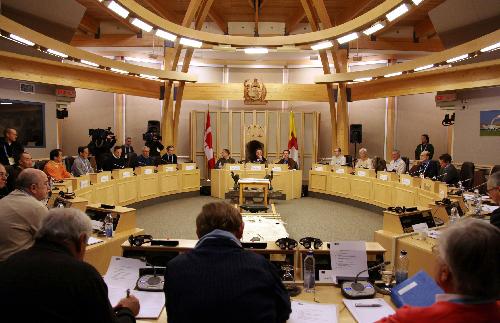Global Biz
G7 reassures on Greece, talks tough on banks
(Agencies)
Updated: 2010-02-07 13:00
 |
Large Medium Small |
|
Finance ministers from the Group of Seven (G7) most industrialized countries attend a meeting in Iqaluit, Canada's Arctic city, Feb. 6, 2010. [Xinhu] |
IQALUIT, Canada: Reassurances about debt-strapped Greece and agreement that banks should pay for future rescue funds capped an international meeting in Canada's Arctic, as European policymakers sought to convince jittery markets that they have things under control.
Ministers and central bank governors said economies were recovering from recession but stuck to their view that it was too early to withdraw government help.
In a statement issued on Saturday after two days of talks by the Group of Seven rich industrialized countries, European Central Bank President Jean-Claude Trichet said he believed Greece would meet tough new targets to rein in its budget gap.
"We expect and we are confident that the Greek government will take all the decisions that will permit it to reach that goal," Trichet said.
French Finance Minister Christine Lagarde said euro zone countries would make sure the Greek plan was implemented and Jean-Claude Juncker, chairman of the group of euro zone finance ministers, dismissed the idea Greece would need money from the International Monetary Fund.
Not everyone was convinced it would be that easy, however, given that Greece's problems already have driven down debt prices of other high-deficit European countries.
World stock markets slumped to three-month lows on Friday on fear that the crisis would spread and the euro fell to its lowest level against the dollar in 8-1/2 months.
|
||||
"The other problem is that the G7 has agreed to put a tax on banks, and any type of taxation on the banking sector is going to be viewed negatively by the market. So the net result of all this is not a boost of confidence in the capital market. We may see a little more turbulence going forward. Overall, the G7 meeting, instead of reassuring the market may have simply created more angst."
Making the banks pay
Greece, which aims to slash its budget deficit of nearly 13 percent of gross domestic product to below 3 percent in 2012, was a late entry to the G7 agenda.
Earlier, ministers had expected talks to focus on efforts to reform a financial sector that is still recovering from the market meltdown caused by the credit crisis.
Officials from the G7, a rich countries' club comprising Britain, Canada, France, Germany, Italy, Japan and the United States, said support was rising for a levy on banks that could pay for global governments' rescue of the financial system.
But such a levy would have to be designed so it did not derail a tentative economic recovery, they said.
US Treasury Secretary Timothy Geithner played down differences between countries on banking reform.











